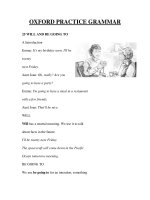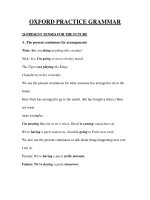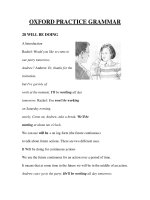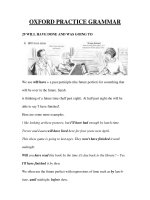Tài liệu OXFORD PRACTICE GRAMMAR 116 pptx
Bạn đang xem bản rút gọn của tài liệu. Xem và tải ngay bản đầy đủ của tài liệu tại đây (85.41 KB, 6 trang )
OXFORD PRACTICE GRAMMAR
116 QUITE AND RATHER
A Quite meaning 'fairly'
Quite usually means 'fairly' or 'a medium amount' (see Unit 115A).
I jeel quite hungry now. Repairing the machine is quite difficult.
The talk was quite interesting. We were quite surprised at the result.
(But see D for another meaning of quite.)
B Stress with quite
In speech, whether we stress quite or the adjective makes a difference to the
meaning.
If we stress quite, it means 'fairly but not very'. If we stress the adjective, the
meaning is positive
The meaning is negative. (but not as positive as very).
The exhibition was quite good, but I've seen The exhibition was quite good. I
enjoyed looking
better ones. round it.
I get up quite early, but not as early as you do. I got up quite early. I had a
lot of jobs to do.
C Quite or rather?
When we make a favourable comment, we usually say quite, not rather.
The book was quite interesting. It's quite warm now. It was quite
nice walking through the park.
In unfavourable comments, we usually say rather, but quite is possible. The
book
was rather boring/quite boring. It was rather awkward/quite awkward
taking my
suitcase on the underground.
Rather in a favourable comment means 'to a surprising or unusual degree'.
It's
rather warm for October. (It isn't usually so warm.) / didn't know David can
cook. He's rather good at it. I expect Tom's jokes were awful. ~ Actually they
were rather funny.
We can use rather with a comparative but not quite.
The meal took rather longer than we expected.
For quite and rather with a/an, see Unit 89B. It
was quite an interesting book.
D Quite meaning 'completely'
With some adjectives, quite means 'completely' or 'totally'.
What you said is quite wrong. {= completely wrong) The
idea is quite absurd. (= totally absurd) The situation is
quite hopeless.
Quite means 'completely' with these adjectives: absurd, alone, amazing,
awful, brilliant, certain, dead,
different, dreadful, extraordinary, false, hopeless, horrible, impossible,
perfect, ridiculous, right, sure,
true, useless, wrong
Compare the uses of quite.
I'm quite tired. (= fairly) I'm quite exhausted. (= completely)
The advice was quite useful. I got one or two The advice was quite useless.
It was absolutely
tips. no good at all.
116 EXERCISES
1 Stress with quite (B)
Which word do we stress, quite or the adjective? Underline the stressed
word.
? These pens are quite good but not as good as the ones I usually buy.
? This book is quite exciting. I can't put it down.
1 These fashions are quite new but not the very latest thing.
2 It's quite late. We'd better be going.
3 The sums are quite easy. I can do them in my head.
4 The music was quite good, but I wasn't really impressed.
5 The sun is quite bright. You'll need your sunglasses.
2 Quite or rather? (C)
Put in these adjectives: better, busy, nice, noisy, popular
Use quite or rather with each adjective. Sometimes either is possible.
Mark: I didn't like that meal very much.
Sarah: The soup was (►) quite nice though, wasn't it?
Mark: The food was (1) ................................ the last time we came.
Sarah: It's (2)…………………….. in here, isn't it? Everyone seems to be
shouting.
Mark: I wasn't expecting the place to be so full. It's
(3)………………………. for a Monday evening
Sarah: This restaurant is (4) .................................., you know.
3 Quite or rather? (C)
Add a sentence expressing the idea in brackets.
Use quite or rather in your sentence. Sometimes either is possible.
► (It's pleasant by the river.)
Let's walk along by the river. It's quite pleasant there.
► (You think Nick is aggressive.)
I don't like Nick much. I think he's rather aggressive.
1 (Changing trains twice is complicated.)
We have to change trains twice
.............................................................................
2 (Your car is big.)
I can give you all a lift
.............................................................................................
3 (The show went on longer than you expected.)
It was a good show,
but.........................................................................................
4 (You made your decision quickly.)
It wasn't a difficult
decision...................................................................................
4 The meanings of quite (A, D)
Does quite mean 'fairly' or 'completely'?
? Try one of these sweets. I think they're quite nice. = fairly nice
? The driver walked away unhurt. It was quite amazing. = completely
amazing
1 I couldn't agree to the idea. It was quite ridiculous. =
2 I need some help with this crossword. It's quite difficult. =









